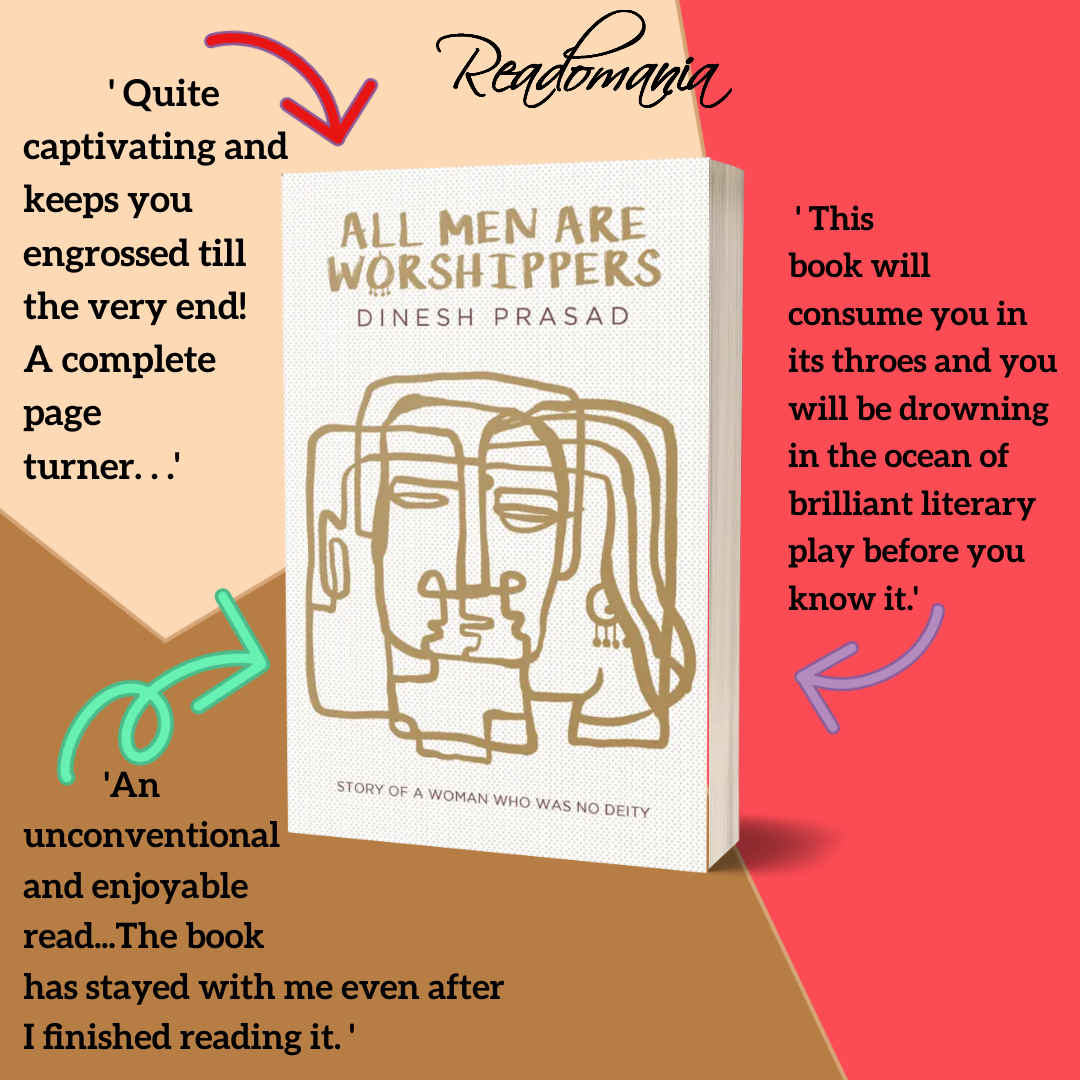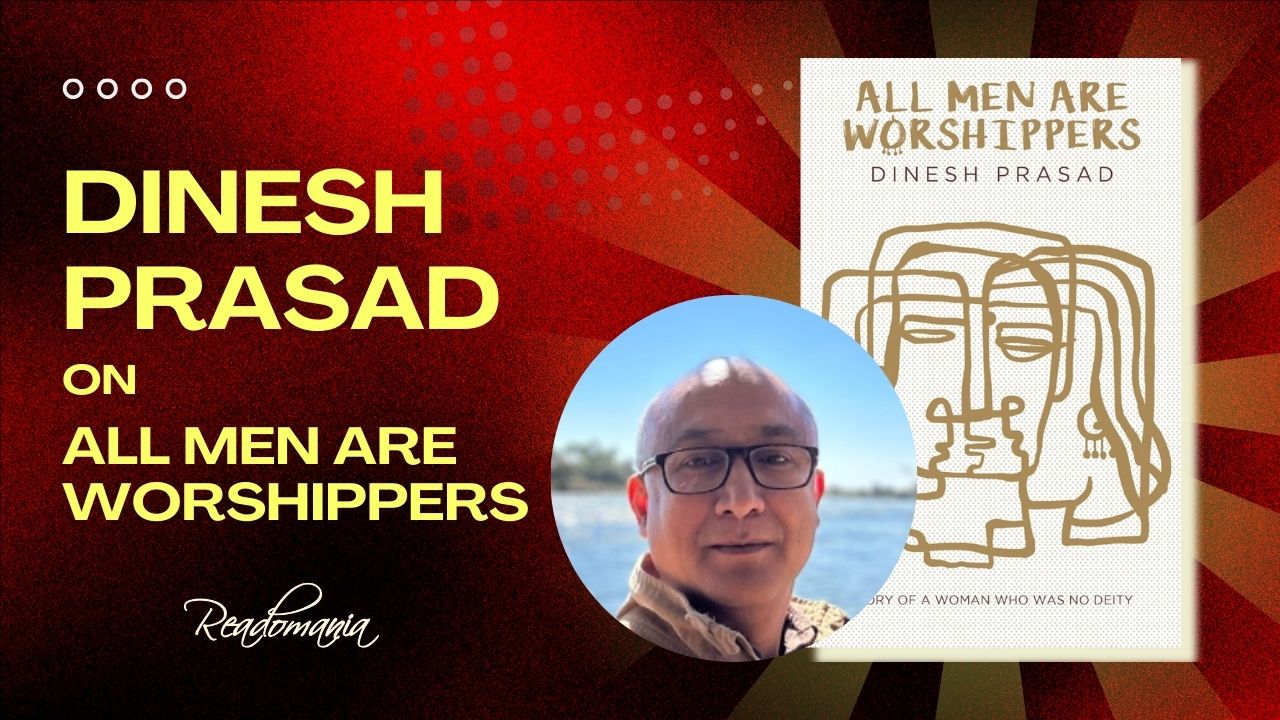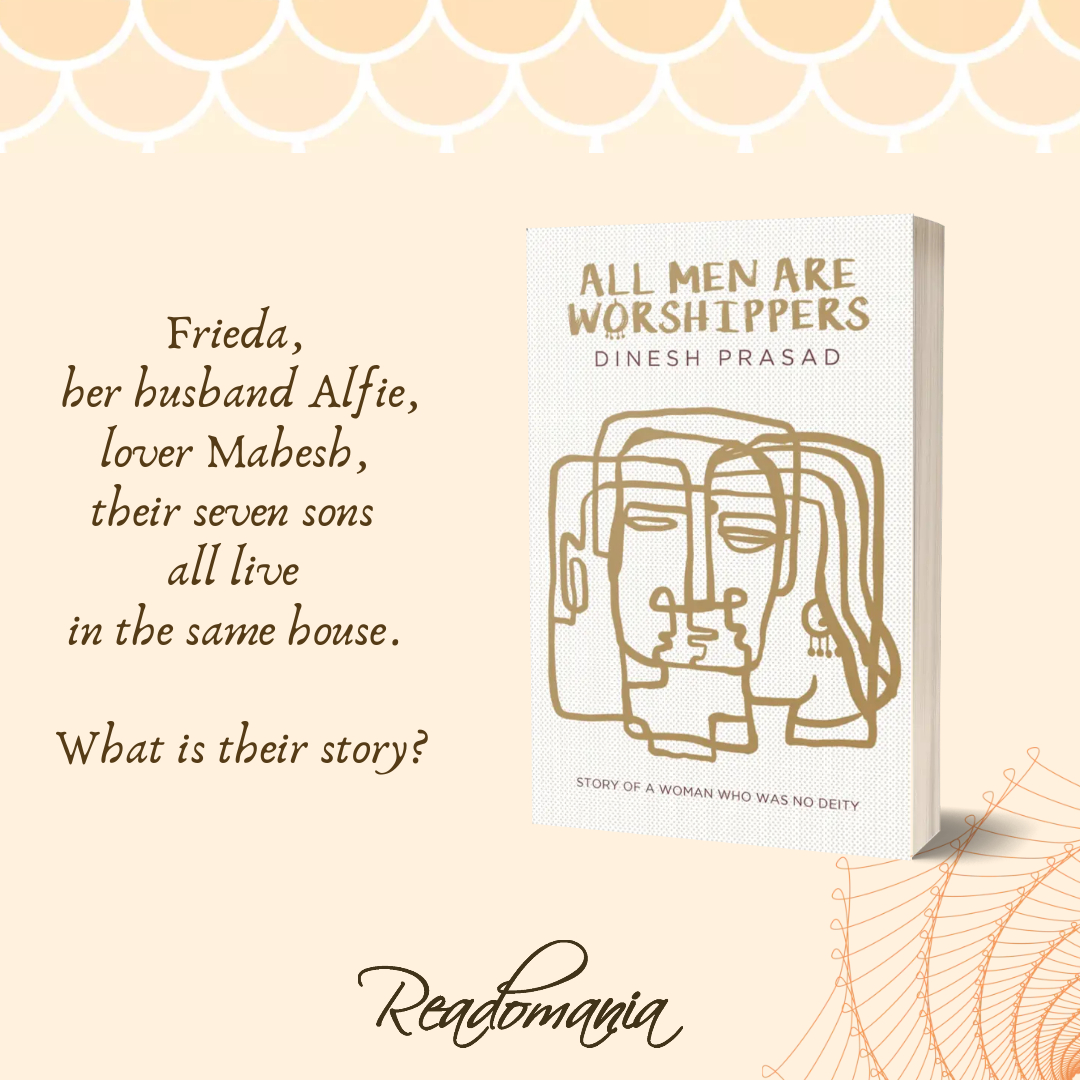Hi Dinesh, congratulations on the success of your book All Men Are Worshippers!
Readomania : Tell us, how did you come up with the idea of this unique story?
Dinesh : Infidelity and polygamy have always been the domain for male protagonists in literature and films reflecting the deep patriarchy in society. Men can have multiple homes with different wives and children from them and continue to manage their place in society without anyone asking them very difficult questions. I have always wondered if a woman can do the same (have multiple husbands) and live with dignity. Of course, everyone will say there was Draupadi with five husbands, there is nothing new about that. But no one will add that her husbands had other wives as well. I wanted to explore the context where a woman has agency to decide her emotional and physical relationship trajectory and what is the price for such a choice, if at all there is one. I conjured up Frieda as the woman who will exercise her will and agency. While I had an idea at a macro level, I had to creatively imagine and manifest the details of the ecosystem of her daily life, her thinking about love and her sons and her friendships. That was the most exciting as well as the difficult part. Exciting because I was creating a character that was far ahead of her times and difficult because she could easily degenerate into a stereotype or a caricature. I am glad she turned out to be very humane and likeable. And the rest of the characters too shaped up well.
Readomania : All Men Are Worshippers has been narrated in second person—a very uncommon style in fiction storytelling. How did you ideate this and what was the reason behind it?
Dinesh : In the first draft, I had written half of the book in first person narrative with three main protagonists taking turns to narrate their part and move the story forward. I was halfway through the draft when I read it as a manuscript, and I found that it read contrived and chaotic. Imagine if I as a writer was struggling with its coherence, what would happen to the readers. I also did not enjoy the style of language where the key emotions and ideas were not creating the impact I had imagined. I decided to scrap it and converted that draft in third person meticulously page by page. This was better but still not what I wanted. The key challenge was I was saying too much about all the characters and the question of who the key protagonist was, was getting lost with Mahesh and Alfie having equally strong storylines as Frieda. I had lost nearly two years in the process. After some struggle, I experimented with writing a chapter with Mahesh as the narrator telling the story to Frieda. This was somewhere in the middle of the plot when she declines to meet him at Sushila Aunty’s Garden as she finds that she is expecting. Mahesh is missing Frieda and imploring her in his thoughts to not end it there. It had the right emotional heft and its resonance was impactful to me. I decided to turn the whole draft into second person. The journey of writing was easy from then on… I was writing as Mahesh and telling it to Frieda. It helped me to get in the skin of Mahesh and live a schizophrenic existence as a writer for the duration I wrote this manuscript. When I was writing, I was Mahesh and when not writing, I was a regular myself. However, both invaded each other’s mental space at odd times like in business meetings, at 3 am in the night, while speaking to someone. This lasted till, and sometime beyond, the last chapter was finished. After that I gained my sanity back.
Readomania : Frieda is such a complex character. She is the topic of gossip and ridicule in her town. Yet, she is worshipped by the men in her life. Is she a goddess, a strumpet, an enigma or a woman seeking love and honour?
Dinesh : Frieda is a normal person with predilections and proclivities, ambitions and affections and needs and wants that anyone can have. What makes her complex is her situations and how she reacts to those situations. Like having a difficult mother makes her stubborn, a husband she doesn't love makes her lonely and a lover who is completely dedicated makes her fight for every bit of respectability from society. Then there are sons each strange and special in their own way and she must ensure the integrity of her household. At the end of the day what is propelling her choices is to maintain a balance in a very precarious relationship between Mahesh and Alfie, between her sons, between alcoholism and poverty in her house and between the society and her household. In maintaining that balance, she must remain affectionate, savvy and cunning and stay in control and that’s what she does till Oorja enters her household and starts questioning the entire basis of the existence of that household. To me when I visualised and wrote about Frieda, I had tremendous respect for her, and I held my judgement based on societal norms in abeyance. To me she must be presented as a lover, a wife, a mother, a sister, a daughter, a mother-in-law, a friend, a sinner, a debtor, a diva and so much more and one person can be all of that in a lifetime. To me she is an endearing character in search of honour, steadfast in decisions and diligent in discharging her responsibilities.
Readomania : On the surface, Frieda seems to be living a life which is sinful. However, not for once does the reader ever dislike her. How did you strike this fine balance on such a delicate issue?
Dinesh : I don’t think she was living a sinful life. She was totally honest, respectful and committed in all her relationships. What we must recognize is her verve and gumption to live a full life despite all the adversities. She had a belligerent mother and a docile father. DC left her at the altar. She did not have a choice in marrying Alfie, and she could not love him. She fell in love with Mahesh. I believe the culpability of complexity lies with the actions of both Alfie and Mahesh. The collateral damage are the children and Girija and to an extent Frieda herself. Despite that she tried to build a home with as much normalcy as possible without blaming anyone. We must empathise with her. That empathy creates a balance where she does not come across either as wanton or a vamp. It is her lack of attribution and apportioning of blame and getting on with building the home each day without regret and with hope that makes her endearing.
Readomania : Frieda’s seven sons are each unique in their own way, with a lot of their characteristics spawning from what their mother went through during her pregnancy. Truly, they are worthy of their own long stories. What was your thought behind giving her sons such different personalities?
Dinesh : I agree that each son is worthy of their own story. I had written a lot more about each of them. My editors told me to whittle it down as it was distracting from the main protagonists’ story and if it was about communicating the impact on their lives, it can be narrated succinctly without consuming an expansive estate of pages after pages. I wanted to bring in some magical realism to communicate their personalities and behaviours. That was not a very organic process. I sat down with an excel sheet and wrote down the parameters of characterization like colour of skin, smell, uniqueness, etc. and then plotted it for each son. I wrote a summary for each son, broadly outlined their physical and behavioural traits and mapped some events of their growing up years and ideas about their spouses/love interests. I simultaneously read a lot of magical realism of Latin American literature to learn how to write those parts seamlessly. What came in the published book is only about one third of what I had written about the sons. But I am content with the final presentation. The sons grew up in a unique environment as a band of brothers with common factors and each reacted in their own inherent individual way to it. One had stopped talking, one was delusional, one grappled with relationship issues, one left home to wander the river etc., each trying to make sense of their situation in their own ways. How deep their respect and love must be for their mother to never affront her with her choices and to respect both the men in her life. I think that is the success of Frieda’s life.

Readomania : The way you have balanced the surreal and the mundane in your book is amazing. And that is your inherent style, isn’t it? Also, how did an engineer and a management graduate get drawn into writing literary fiction?
Dinesh : This is a difficult one. There was never a singular moment in time when I decided that I will now become an author. I believe it was a gradual evolution. I come from a family where women are great storytellers and men are great story makers. I must have imbibed all the gossip, drama and narratives by just being present in that environment. I loved my grandmother immensely and she was an inadvertent narrator of stories in idioms, riddles and similes that were both classical as well as invented. She told stories in magical realism before I realised there was a genre such as that and then when I recognized it as a form of literature, I just deep dived into it.
I did not enjoy studying engineering even though I was excelling academically. I thought there was no soul in machines. Now when I think about it, engineering gave me structure in thinking and in organising my thoughts for cogent writing. I thoroughly enjoyed my studies at IIMA and got exposed to a lot of Avant Garde art there; in literature, drama and music and that opened a whole new world.
I believe there were two important events that may have shaped my ambition. One was a course in IIMA called Exploration of Roles and Identities (not many people take this course as it is a relaxed course and open ended) and there you must submit a detailed ten-thousand-word assignment as part of evaluation. I had submitted a story which was part fiction and part real. I got an A in that course with some flattering detailed comments by the professor. The seed must have germinated then.
While working, I had a boss who was also a dear friend and an accomplished published poet. His name was Deepankar Khiwani. He read some random writing of mine which was a frivolous effort to fill time. He gave me editorial comments and some serious feedback on structure and presented me with a book on how to interpret poems. I think I took writing seriously after that.
Readomania : Was there any particular reason why you chose to set the story in an unnamed town of central India?
Dinesh : The mystery of the unnamed town of central India lies in my inspiration. I am inspired by a fictional town Macondo that Gabriel Garcia Marquez created in his novels. He used it through all his works. I am also inspired by the small town called Jabalpur where I come from, where Narmada flows and where my family has lived for a few generations. I have taken motifs from my town and superimposed them on an imaginary topography to create the location of my story. I did not want to name the place because it could be any place then and while the place takes away the distraction, the focus remains sharply on the three key protagonists. Having said that my next short story collection manuscript is called Pin Codes of Love, where each story takes place in a specific pin code. So, I am not averse to naming a place. It was a creative tool that I used for All Men Are Worshippers and maybe I will use it again for a different unnamed metropolis where another novel of mine is based.
Readomania : The story traverses multiple decades beginning pre-Independence and traces the socio-political milieu of the nation then. What was the thought behind the timeline of your book?
Dinesh : It’s a story of Frieda’s lifetime. Therefore, it was supposed to be expansive from the timeline perspective. The period I have set my novel in, was a great time of evolution of political thought in independent India. It helps to establish the context in the evolution of the characters, particularly Mahesh’s character. I wrote down the decades on a paper and outlined the key events in the different characters’ graphs. It was a 2X2 matrix with a timeline on one axis and the characters on the other. I also wrote down the years of birth of each character and used maths to calculate their age for the appropriateness of the events in their life. It also helped to articulate the interactions and keep the storyline sane. So yeah, it was fun working with the structure of a timeline.
Readomania : How does one define the strange relationship between Frieda, her husband Alfie and her lover, Mahesh?
Dinesh : One can love many things at the same time. You could love five books, three movies, eight dishes but you are allowed to love only one person. Society gives you multiple choices in everything except for a partner. How is that fair? Well, some people dare to break that norm and establish a different vision for their emotional nirvana. The important thing is that you must then also accept the consequences of that choice. Frieda wanted love and children, and Mahesh gave her that. Frieda wanted honour and home, and Alfie gave her that. But none of that would have been possible if Mahesh and Alfie did not love Frieda. Alfie’s love was impetuous while Mahesh’s was a steadfast one. And Frieda loved them both for different reasons. Yes, it was complex, but it was also possible given the respect and space they gave to each other. There was tacit complicity to ensure that each stood by the decision they had taken, and they worked through the situations to the very best they could. Such relationships must exist because once the book came out, many people narrated similar stories of people in tripartite relationships for a lifetime. However, I don’t recall anyone telling me about the children in such situations. So that part remains purely fictional in the book.
Readomania : What do you feel the reader should take away from All Men Are Worshippers?
Dinesh : Simply enjoy reading the book as much as I enjoyed writing it! You will come across parts that will be your reflection staring back at you… so go ahead, pick the book and R E A D!



Comments